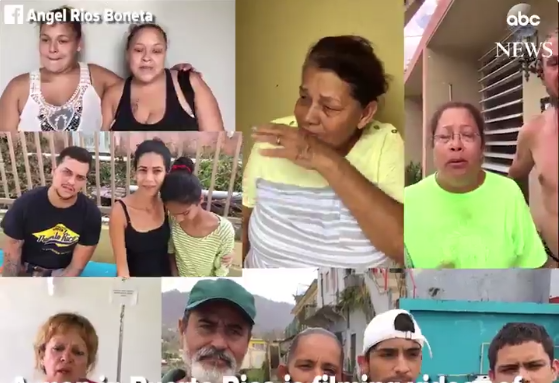Puerto Rico is just beginning to recover from the “apocalyptic” devastation caused by Hurricane Maria—a storm that Governor Ricardo Rossello called “probably the single biggest hurricane catastrophe in the history of the U.S.” With more than half the island still without power, families have struggled to get in contact with loved ones and friends. But one man is trying to change that. As ABC News reported, 31-year-old Puerto Rican native Angel Rios Boneta has become somewhat of a modern day telephone operator, attempting to connect survivors with their families on the U.S. mainland and around the world via social media.
Man in Puerto Rico uses social media to connect stranded residents with relatives on the island and abroad. https://t.co/OG3i41HDbJ pic.twitter.com/Ke21Vake3u
— ABC News (@ABC) September 28, 2017
On his personal Facebook page, Rios Boneta has begun posting short videos in both English and Spanish of Puerto Rican residents simply stating who they are and how they are faring in hopes that the messages will make it to their loved ones. In one clip, a man identifies himself as Robert Stone and shares that he wants his family in Virginia, Georgia, and Wisconsin to know he is “okay” and “well taken care of.”
https://www.facebook.com/angelrolorios/videos/10155066052971909/?permPage=1
“My name is Robert Stone, I live in Utuado, Puerto Rico and I am from Hampton, Virginia and I have friends in Hampton and I have relatives in Georgia and Wisconsin and if they see this thing, know that I am OK and that I’m well taken care of,” he said. ” That’s it.”
While Rios Boneta lives in San Juan with his two children, he drove to the town of Utuado in the immediate aftermath of the storm to check in on family members. What he found was a community in desperate need of gas, power, and basic necessities like food and running water.
“I arrived in Utuado and people were begging me for water, for food,” he emotionally recounted to ABC News.
Additionally, residents were desperate to get in touch with family and friends. During the initial visit, one of his uncles asked him to take a cellphone video of his daughter who lived in another town, so he could see she was fine. That request sparked the idea.
“I feel satisfaction that family members can see that they’re alive,”Rios Boneta said. “There are many people who don’t know about their families since day one. For a full week they don’t know if they’re alive, and the videos help.”
fOnce he started posting the videos, requests and comments from around the globe started pouring in, thanking Rios Boneta for his efforts and begging him to locate loved ones.
“It’s not just a person saying ‘hi’ to their moms or their children. They don’t know if other family members are also watching them,” he explained. “When I get to San Juan and start uploading the videos, I get flooded with messages thanking me for this. People are also contacting me offering help, what they can send, if they can send money for fuel, etc.”
With the recovery effort just beginning, Rios Boneta said he will continue to post videos until there is no longer a need to do so. Despite a lack of resources even in major metropolises like San Juan, he regularly travels back and forth from the capital city to Utuado to deliver fuel, food, and water. He himself queues for hours to receive a stipend of gas for his small car that he pays for out-of-pocket, but he doesn’t seem to mind the expense or wait.
“I’m not planning to stop,” he said. “I’ll keep doing this until things get back to normal, or until someone tells me I need to stop—and they better give me a valid reason for asking me not to keep doing this.”
(H/T: ABC News)


